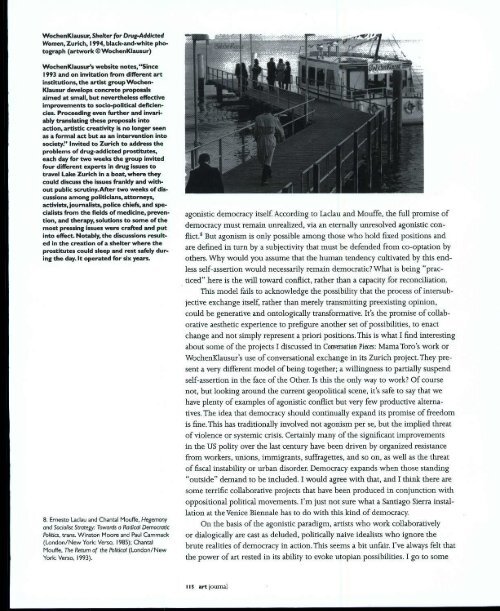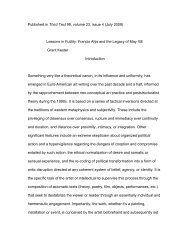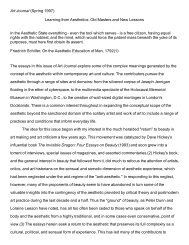Art Journal interview with Mick Wilson - Grant Kester
Art Journal interview with Mick Wilson - Grant Kester
Art Journal interview with Mick Wilson - Grant Kester
Create successful ePaper yourself
Turn your PDF publications into a flip-book with our unique Google optimized e-Paper software.
WochenKlausur, Shelter for Drug-Addicted<br />
Women, Zurich, 1994, black-and-white photograph<br />
(artwork @WochenKlausur)<br />
WochenKlausur's website notes,"Since<br />
1993 and on invitation from different art<br />
Institutions, the artist group Wochen-<br />
Klausur develops concrete proposals<br />
aimed at small, but nevertheless effective<br />
Improvements to socio-political deficiencies.<br />
Proceeding even further and invariably<br />
translating these proposals into<br />
action, artistic creativity is no longer seen<br />
as a formal act but as an Intervention into<br />
society." Invited to Zurich to address the<br />
problems of drug-addicted prostitutes,<br />
each day for two weeks the group invited<br />
four different experts In drug Issues to<br />
travel Lake Zurich In a boat, where they<br />
could discuss the issues frankly and <strong>with</strong>out<br />
public scrutiny.After two weeks of discussions<br />
among politicians, attorneys,<br />
activists, journalists, police chiefs, and specialists<br />
from the fields of medicine, prevention,<br />
and therapy, solutions to some of the<br />
most pressing issues were crafted and put<br />
into effect. Notably, the discussions resulted<br />
in the creation of a shelter where the<br />
prostitutes could sleep and rest safely during<br />
the day. It operated for six years.<br />
8. Emnesto Laclau and Chantal Mouffe, Hegemony<br />
and Socialist Strategy: Towards a Radical Democratic<br />
Politics, trans. Winston Moore and Paul Cammack<br />
(London/New York: Verso, 1985); Chantal<br />
Mouffe, The Return of the Political (London/New<br />
York: Verso, 1993).<br />
agonistic democracy itself. According to Laclau and Mouffe, the full promise of<br />
democracy must remain unrealized, via an eternally unresolved agonistic con-<br />
flict. 8 But agonism is only possible among those who hold fixed positions and<br />
are defined in turn by a subjectivity that must be defended from co-optation by<br />
others. Why would you assume that the human tendency cultivated by this endless<br />
self-assertion would necessarily remain democratic? What is being "prac-<br />
ticed" here is the will toward conflict, rather than a capacity for reconciliation.<br />
This model fails to acknowledge the possibility that the process of intersubjective<br />
exchange itself, rather than merely transmitting preexisting opinion,<br />
could be generative and ontologically transformative. It's the promise of collaborative<br />
aesthetic experience to prefigure another set of possibilities, to enact<br />
change and not simply represent a priori positions. This is what I find interesting<br />
about some of the projects I discussed in Conversation Pieces: Mama Toro's work or<br />
WochenKlausur's use of conversational exchange in its Zurich project. They pre-<br />
sent a very different model of being together; a willingness to partially suspend<br />
self-assertion in the face of the Other. Is this the only way to work? Of course<br />
not, but looking around the current geopolitical scene, it's safe to say that we<br />
have plenty of examples of agonistic conflict but very few productive alternatives.<br />
The idea that democracy should continually expand its promise of freedom<br />
is fine. This has traditionally involved not agonism per se, but the implied threat<br />
of violence or systemic crisis. Certainly many of the significant improvements<br />
in the US polity over the last century have been driven by organized resistance<br />
from workers, unions, immigrants, suffragettes, and so on, as well as the threat<br />
of fiscal instability or urban disorder. Democracy expands when those standing<br />
"outside" demand to be included. I would agree <strong>with</strong> that, and I think there are<br />
some terrific collaborative projects that have been produced in conjunction <strong>with</strong><br />
oppositional political movements. I'm just not sure what a Santiago Sierra installation<br />
at the Venice Biennale has to do <strong>with</strong> this kind of democracy.<br />
On the basis of the agonistic paradigm, artists who work collaboratively<br />
or dialogically are cast as deluded, politically naive idealists who ignore the<br />
brute realities of democracy in action. This seems a bit unfair. I've always felt that<br />
the power of art rested in its ability to evoke utopian possibilities. I go to some<br />
I I S art journal




